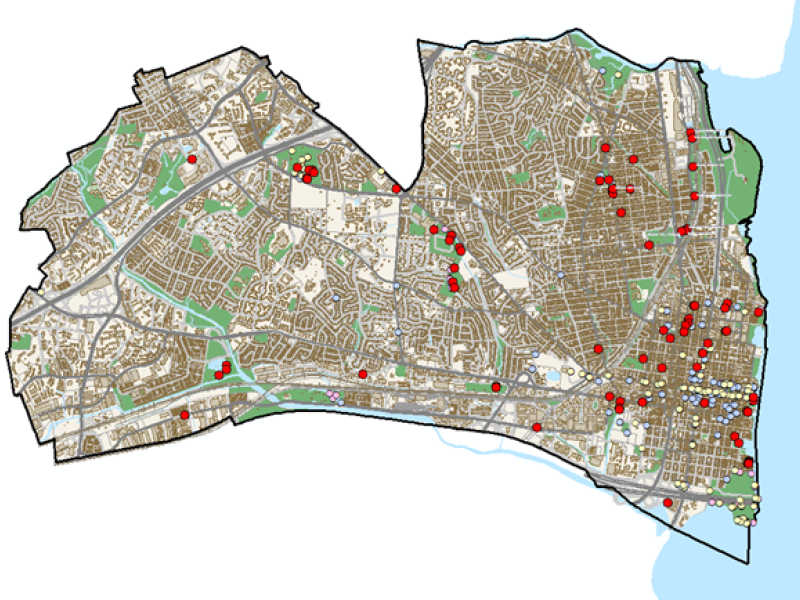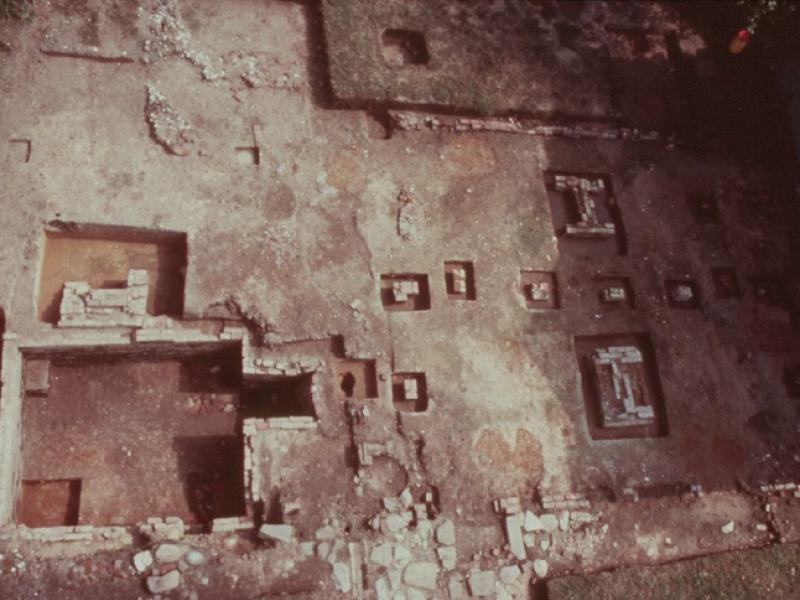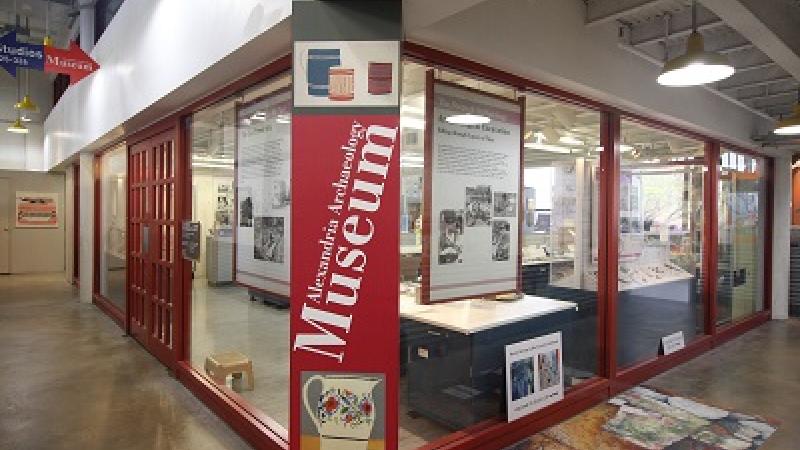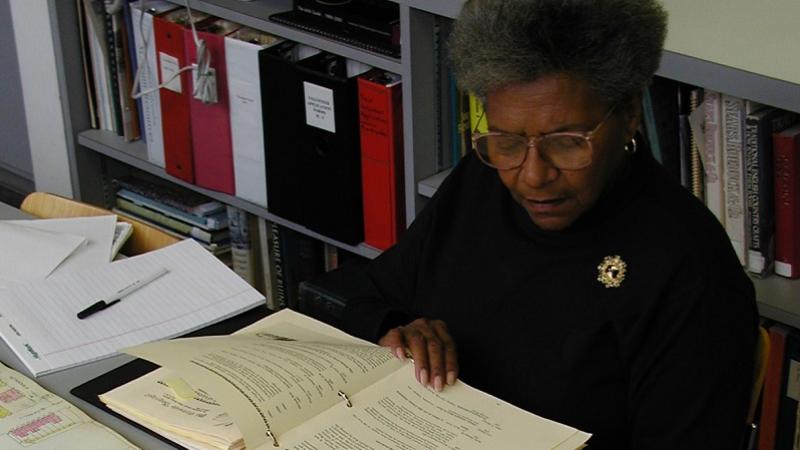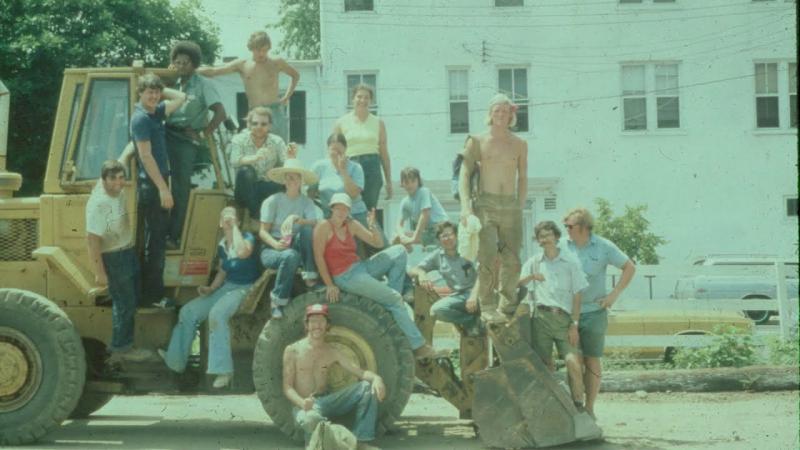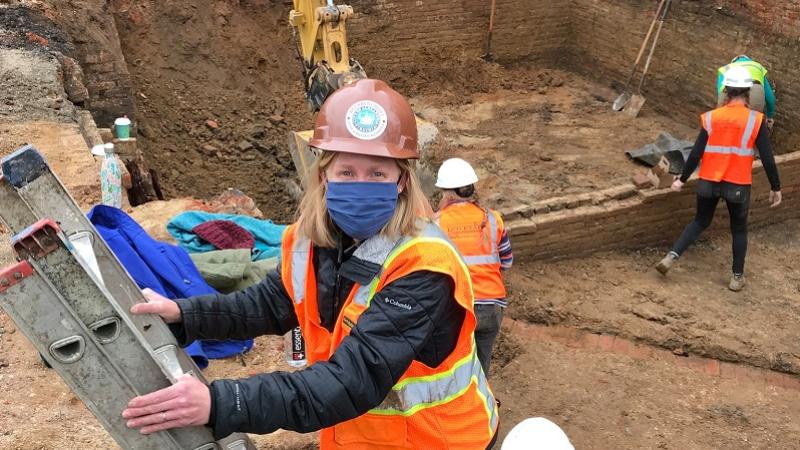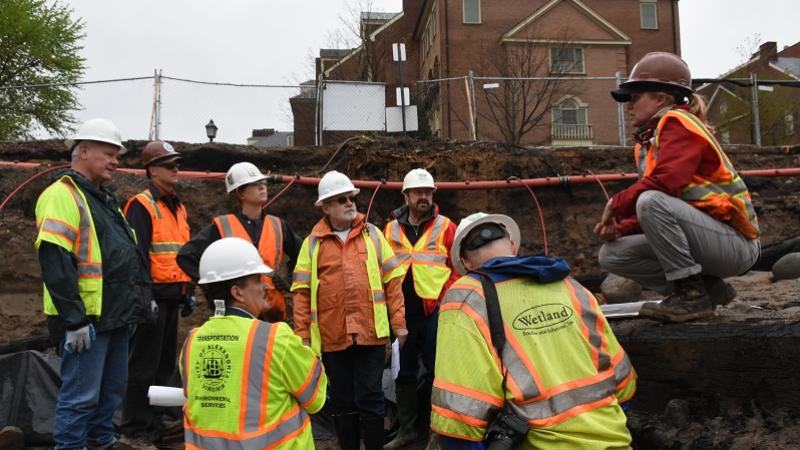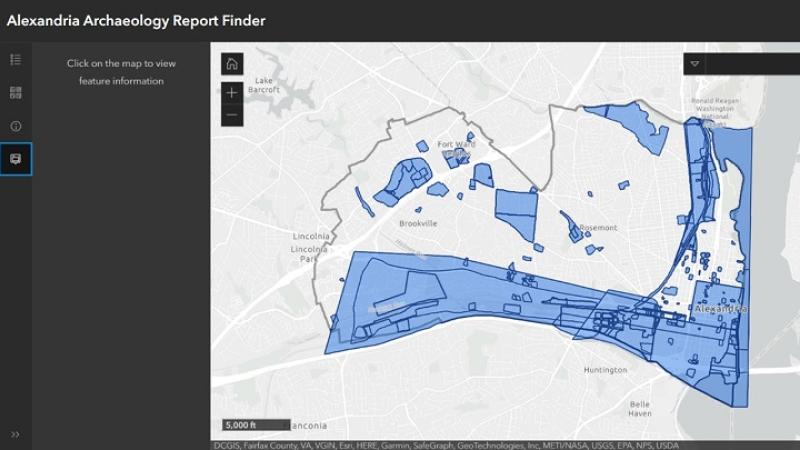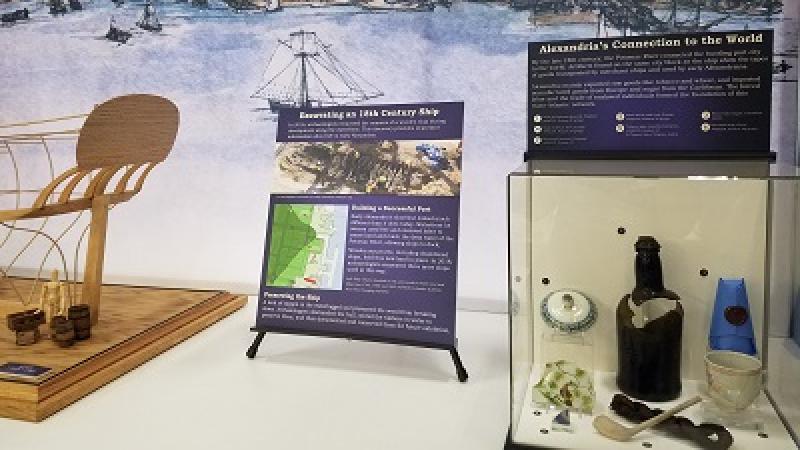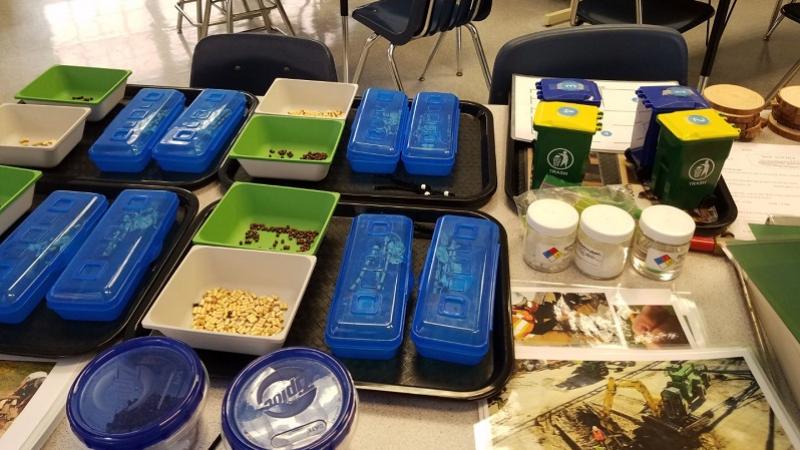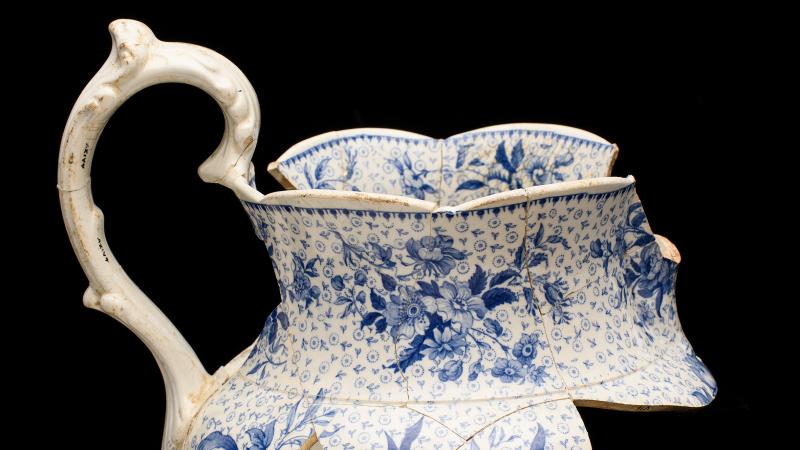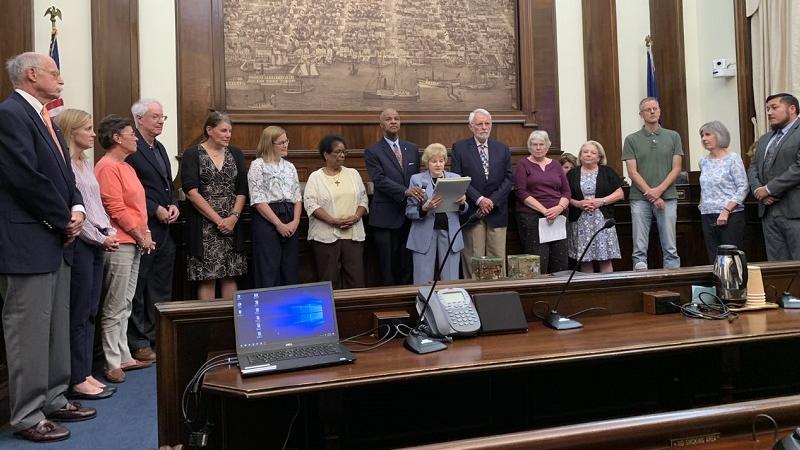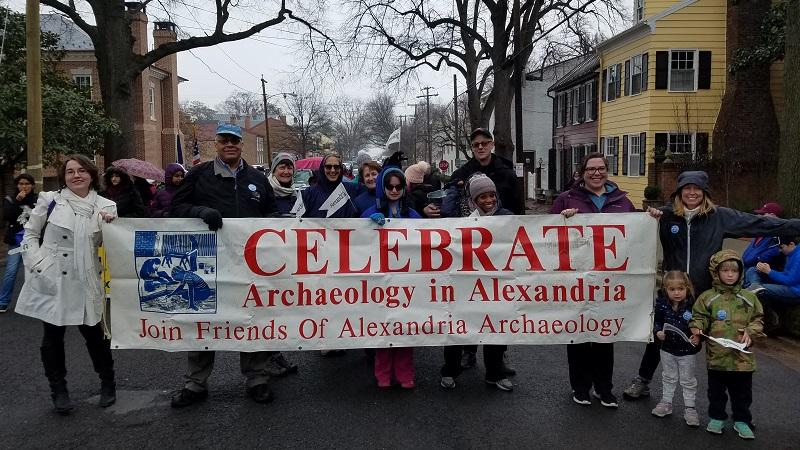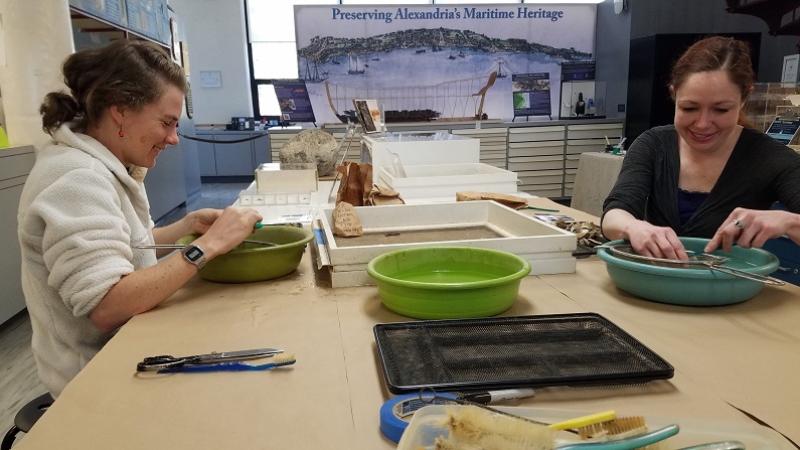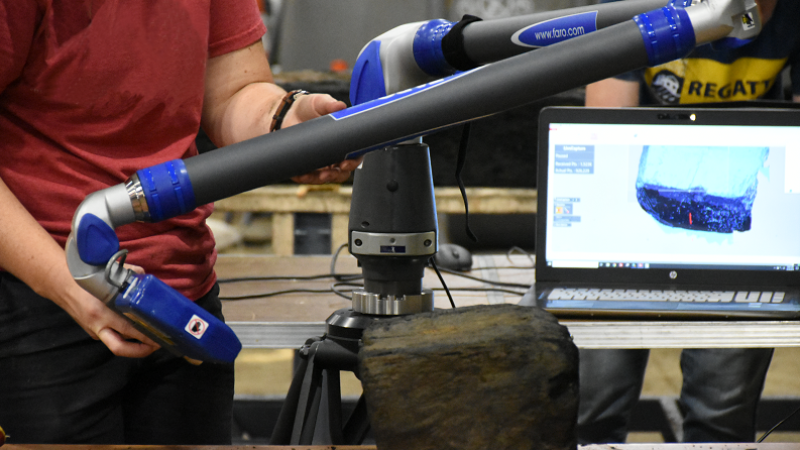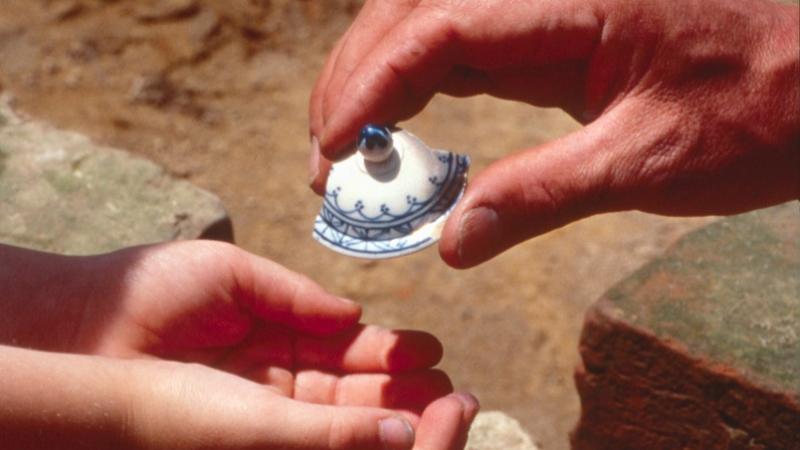Alexandria Archaeology Museum
The Alexandria Archaeology Museum and its staff offices will be closed on Tuesday, February 24 due to scheduled building maintenance.
The Alexandria Archaeology Museum
The Alexandria Archaeology Museum is dedicated to preserving and studying Alexandria’s rich archaeological heritage and fostering within residents and visitors a connection between the past and present while inspiring a sense of stewardship and adventure.
Visit the museum and lab on the third floor of the Torpedo Factory Art Center, at 105 N. Union Street in historic Old Town Alexandria.
Special Exhibit
About Alexandria Archaeology
Archaeology in the City
Museum and Outreach
Get Involved
More Information
Contact the Museum
Alexandria Archaeology Museum
105 N. Union Street
Alexandria, Virginia 22314
703.746.4399
Social Media
Stay Connected with Historic Alexandria
- Like us on Facebook: Alexandria Archaeology Museum
- Watch us on YouTube: Alexandria Archaeology Museum
- See us on Instagram: Alexandria Archaeology
Mission Statement
The Alexandria Archaeology Museum is dedicated to preserving and studying Alexandria’s rich archaeological heritage and fostering within residents and visitors a connection between the past and present while inspiring a sense of stewardship and adventure.
Archaeology in the City: A Few Project Highlights
Project Highlights: African American Archaeology
Alexandria Slave Pen
At the site of the Alexandria Slave Pen, archaeologists uncovered structural remains relating to the whitewashed brick wall surrounding the men's yard and a line of post holes for posts which once supported a shed roof. A few of the artifacts relate to the slave pen, while others were discarded at the site by soldiers held there during the Civil War when the building was used as a jail. Read the site report. Now known as Freedom House Museum, 1315 Duke Street is open to the public.
Bruin Slave Jail
Joseph Bruin, a slave trader, used the building at 1707 Duke Street from 1844-1861, to house slaves before he shipped them to the south. The Bruin Slave Jail is on the National Register of Historic Places.
Shuter's Hill Plantation
An ongoing excavation on Shuter's Hill near the Masonic Memorial is exploring the Mills/Lee/Dulaney plantation, built in 1782. Excavations have focused on a laundry outbuilding where enslaved African Americans lived and worked. Read a brochure.
Contrabands and Freedmen Cemetery
Archaeological investigations at Contrabands and Freedmen Cemetery on South Washington Street focused on the identification of burial locations to ensure protection during development and future maintenance of the site, and the recovery of information about the cemetery for use in the memorial design process.
The Fort
The Office of Historic Alexandria is engaged in an effort to study and preserve the historic resources related to The Fort African American community formerly located at Fort Ward Park. Learn more about 2009-2012 archaeological excavations focusing on resources relating to the post-Civil War African American community. In 2009, The City of Alexandria’s ground-penetrating radar (GPR) survey identified 38 possible unmarked burials in six known and potential cemetery and grave locations in “The Fort” (44AX90) and the Old Grave Yard (44AX153). The adjacent photo shows "Fort" community leader Clara W. Adams' gravestone. Further archaeological work took place in 2012.
Project Highlights: Alexandria's Potters
The Piercy Pottery
Henry Piercy was Alexandria’s first potter. He came from Philadelphia in 1792, and made slip-decorated earthenware in the Philadelphia style. Read In the Philadelphia Style: The Pottery of Henry Piercy, in Ceramics in America.
The Wilkes Street Pottery
The Wilkes Street Pottery is the site of stoneware potters John Swann and B. C. Milburn. The Virginia Research Center for Archaeology conducted rescue excavations here on four weekends in 1977, recovering thousands of pottery fragments, pieces of kiln furniture used to stack the pottery, and a fragment of a brick interior arch from a kiln. Learn more about the pottery of Swann and Milburn from articles published in Ceramics in America.
Tildon Easton
Tildon Easton, a lesser known potter, manufactured both earthenware and salt-glazed stoneware for a very short period of time, between 1841 and 1843. His kiln, on the 1400 block of King Street, was excavated in 1985. Read A New Look at Old Stoneware: The Pottery of Tildon Easton, in Ceramics in America.
Project Highlights: Business and Industry
Robert Portner Brewing Company
The large Robert Portner Brewing Company made Tivoli Brand lager beer from 1868 until Prohibition. A site report and extensive history are available for this site.
Shuter's Hill Brewery
Shuter's Hill Brewery, an early German lager brewery was built in 1858 and burned in 1893. The brick-vaulted beer cellar was excavated, and has been preserved under the corner of Duke and Dulaney Streets. Read the site report.
Virginia Glass Company
In 1997, Archaeologists working at the Carlyle development on Duke Street discovered foundations, furnaces, ovens, a chimney base, and thousands of artifacts from the Virginia Glass Company (1894-1916). Archaeologists also found evidence of a fire known to have taken place in 1895, and the fire that destroyed the business in 1916. Read the site report.
Potomac Yard
Alexandria Archaeology has been interested in the history and landscape of Potomac Yard for decades. Since the 1980s, archaeological firms have conducted historical studies and investigations of various segments of the area either for developers as part of the City’s archaeological code or for planning efforts. A vast amount of information has been acquired on the history, prehistoric and historic landscapes, and architecture of the area.
- History and Archaeology at Potomac Yard
- The History of Potomac Yard: A Transportation Corridor through Time, by Francine Bromberg, Alexandria Archaeology.
The following archaeological site reports were prepared for the Potomac Yard project:
Adams, Robert M.
- 1996 - Report on R, F & P Potomac Yard – Track Relocation Project. International Archaeological Consultants, Hayes, Virginia. (This report not available online.)
- 1996 - The Archaeological Investigation of the Former Preston Plantation and Alexandria Canal at Potomac Yard. Alexandria, Virginia. International Archaeological Consultants, Hayes, Virginia.
Cheek, Charles D. and Dana B. Heck
- 1996 - Archeological Observations at the Townes at Slater's Village Alexandria, Virginia. John Milner Associates, Inc., Alexandria, Virginia.
Johnson, Edward and Tammy Bryant
- 2012 - Letter Report: Archaeological Investigations within Landbay L, Potomac Yard Property, City of Alexandria, Virginia. Thunderbird Archaeology, Gainesville, Virginia
Kaye, Ruth Lincoln
- 1988 - Study of Local Maps and Plats for the Potomac Yard Property. (This report not available online.)
Mullen, John P. and Curt Breckenridge
- 2007 - Archaeological Resource Management Plan for the Potomac Yard Property, Landbays E, G, H, I, J, K, L, and M, City of Alexandria, Virginia. Thunderbird Archaeology, Gainesville, Virginia. Report Part I. Report Part II. Appendices.
Mullen, John P. and William P. Barse
- 2012 - Archaeological Investigations within a Portion of Potomac Avenue and Associated East/West Roads and of Site 44AX0204, Potomac Yard Property, City of Alexandria, Virginia. Thunderbird Archaeology, Gainesville, Virginia. Plates and Appendices.
Rose, Craig
- 2011 - Geoarchaeological Investigations of a Portion of Landbay G, Potomac Yard Property, City of Alexandria, Virginia. Thunderbird Archaeology, Gainesville, Virginia.
Wagner, Daniel P.
- 2003 - Sedimentological and Geomorphological Interpretations of Borings Along a Planned Outfall Pipe at the Potomac Greens Development in Alexandria, Virginia. Geo-Sci Consultants, Inc. University Park, Maryland. (This report not available online.)
Walker, Mark K. and Marilyn Harper
- 1989 - Potomac Yard Inventory of Cultural Resources. Engineering Science, Inc., Washington, D.C.
Project Highlights: Civil War Archaeology
The Archaeology of Civil War Crimean Ovens
Two intriguing discoveries were made in Alexandria in 2003 and 2004. These were underground heating structures built by Union troops during the Civil War to heat hospital tents. It is believed that these are the first features of this exact type to be excavated. These structures were called Crimean Ovens and may have been somewhat experimental in nature.
Archaeological Site Reports
- Battery Heights, 44AX186: Fiedel, Stuart J. and Bryan Corle, Results of Archeological Survey Battery Heights, Alexandria. John Milner Associates, Inc., Alexandria, Virginia, 2001.
- Bontz Site/West End Village, United States Military Railroad Complex, 44AX103 and 105 (1989 Phase II investigation): Cromwell, T. Ted, A Phase II Cultural Resource Evaluation of Duke Street (Route 236), Between the 1100 and 1900 Blocks, in the City of Alexandria, Virginia. James Madison University, Archæological Research Center, Harrisonburg, Virginia, 1989.
- Bontz Site/West End Village, Spring Garden Farms/United States Military Railroad Complex, 44AX103 and 105 (1989 Phase III investigation): Cromwell, T. Ted and Timothy J. Hills, The Phase III Mitigation of the Bontz Site (44AX103) and the United States Military Railroad Station (44AX105) located on the South Side of Duke Street (Route 236) in the City of Alexandria, Virginia. James Madison University Archaeological Research Center, Harrisonburg, Virginia, 1989. Appendices, Public Summary.
- Bush Hill, 44AX111: Gardner, William M. and Gwen Hurst, A Phase IA Background and Documentary Study of Three Properties at 2201 Eisenhower Avenue and 2310 and 2318 Mill Road, Alexandria, Virginia. Thunderbird Archeological Associates, Inc., Woodstock, Virginia, 2002.
- Bush Hill, 44AX111: Gardner, William M. and Gwen Hurst, Phase IA Documentary Study of 10.67 Acres at 4840 Eisenhower Avenue, Alexandria, Virginia. Thunderbird Archeological Associates, Inc., Woodstock, Virginia, 1999.
- Custom Homes: Walters, Patrick and Michael Clem, A Phase I Archaeological Survey of 12 Lots on Taft Avenue and Donelson Street and Adjacent Stream Restoration Area, City of Alexandria, Virginia. Cultural Resources, Inc., Frederick, MD, 2008. Public Summary.
- Episcopal High School Faculty Housing, 44AX200: Balicki, Joseph, Kerri Holland, Bryan Corle, Archaeological Evaluation and Resource Management Plan for Episcopal High School Faculty Housing, 1200 Quaker Lane, Alexandria, Virginia. John Milner Associates, Inc., Alexandria, Virginia, 2006. Public Summary
- Fannon Petroleum Fuel Company (2007 investigation): Bryant, Tammy, Documentary Study of the 1300 Block of Duke Street, Alexandria, Virginia. Thunderbird Archaeology, Gainesville, Virginia, 2007. Public Summary.
- Fort Ward, 44AX90: Larrabee, Edward McM., Fort Ward, Alexandria, Virginia: Exploratory Excavation of the Northwest Bastion, 1961.
- Franklin and Armfield Slave Pen/Alexandria Hospital, 44AX75: Artemel, Janice G., Elizabeth A. Crowell and Jeff Parker, The Alexandria Slave Pen: The Archaeology of Urban Captivity. Engineering-Science, Inc., Washington, D.C., 1987.
- 1400 Janney's Lane, 44AX191: Jirikowic, Christine, Gwen J. Hurst and Tammy Bryant, Phase I Archeological Investigation at 1400 Janney's Lane, Alexandria, Virginia. Thunderbird Archeological Associates, Inc., Woodstock, Virginia, 2004. Public Summary
- Keith's Wharf/Battery Cove/Ford's Landing/"Old Ford Plant," 44AX119: Artemel, Janice G. Elizabeth Crowell, Donald A. Hull and Dennis Knepper, A Phase IIA Archaeological Study, Old Ford Plant Site, Alexandria, Virginia. Appendices. Engineering-Science, Inc., Washington, D.C., 1988.
- Keith's Wharf/Battery Cove/Ford's Landing/"Old Ford Plant," 44AX119: Cheek, Charles D. and Cecile G. Glendening, A Phase I Archaeological Survey of the Old Ford Plant Property, City of Alexandria, Virginia. John Milner Associates, Inc., Alexandria, Virginia, 1986.
- Keith's Wharf/Battery Cove/Ford's Landing/"Old Ford Plant," 44AX119: Engineering-Science, Inc., 1993 Maritime Archaeology at Keith's Wharf and Battery Cove (44AX119): Ford's Landing, Alexandria, Virginia Chapters I-VI, Chapters VII-X, Appendices Washington, D.C., 1993.
- L'Ouverture Hospital/Shiloh Baptist Church: Traum, Sarah, Joseph Balicki and Brian Corle, A Documentary Study, Archeological Evaluation and Resource Management Plan for 1323 Duke Street, Alexandria, Virginia, 2007. John Milner Associates, Inc., Alexandria, VA. Public Summary.
- 1226 North Pegram Street, 44AX198: Balicki, Joseph, Kerri Holland, Bryan Corle and Lynn B. Jones, Documentary Study and Archaeological Investigation, 1226 North Pegram Street and Polk Avenue (44AX198), Alexandria, Virginia, John Milner Associates, Inc., Alexandria, Virginia, 2008.
- Potomac Yard: Walker, Mark K. and Marilyn Harper, Potomac Yard Inventory of Cultural Resources. Engineering Science, Inc., Washington, D.C., 1989.
- Potomac Yard/Potomac Yard Center: Adams, Robert M., Report on R, F & P Potomac Yard – Track Relocation Project. International Archaeological Consultants, Hayes, Virginia.
- Potomac Yard/Townes at Slater's Village: Cheek, Charles D. and Dana B. Heck, Archeological Observations at the Townes at Slater's Village Alexandria, Virginia. John Milner Associates, Inc., Alexandria, Virginia, 1996.
- 206 North Quaker Lane, 44AX193: Jirikowic, Christine, Gwen J. Hurst and Tammy Bryant, Phase III Archeological Investigations at 206 North Quaker Lane, Alexandria, Virginia. Thunderbird Archeological Associates, Inc., Woodstock, Virginia. Public Summary.
- Quaker Ridge, 44AX195: Balicki, Joseph, Bryan Corle, Charles Goode and Lynn Jones, Archaeological Investigations for Quaker Ridge Housing (44AX195), Alexandria, Virginia. John Milner Associates, Inc., Alexandria, Virginia, 2005. Public Summary.
- Spring Garden/Old Town Village (1999 investigation): Gardner, William M., Kimberly A. Snyder, Gwen Hurst, Joan M. Walker and John P. Mullen, Excavations at the Old Town Village Site, Corner of Duke and Henry Streets, Alexandria, Virginia: An Historic and Archeological Trek Through the 200 Year History of the Original Spring Garden Development, Volume I, and Volume II (Artifact Inventory). Thunderbird Archeological Associates, Inc., Woodstock, Virginia, 1999.
- Spring Garden/Southern Plaza/Old Town Village (1988 investigation):Seifert, Donna J., Ph.D., Cecile G. Glendening and Walton Owen, An Archæological Assessment of the Southern Plaza Project Area, Alexandria, Virginia, John Milner Associates, Inc., Alexandria, Virginia, 1988.
- Stonegate Parcel C (1996 investigation): Adams, Robert M., Preliminary Archaeological Investigation of the Stonegate Development (Parcel C) West Braddock Road, City of Alexandria, Virginia. International Archaeological Consultants, Rawlins, Wyoming, 1996.
- Virginia Theological Seminary Faculty Housing, 44AX173a: Embrey, James W., Lynn D. Jones and Joseph Balicki, Documentary Study, Archaeological Evaluation and Resource Management Plan for Virginia Theological Seminary Faculty Housing, Alexandria, Virginia, John Milner Associates, Inc., Alexandria, Virginia, 2005. Public Summary - Artifact Inventory
- Weicking Property: Straka, Jeffrey and Michael Clem, Phase I Archaeological Survey and Monitoring of the Weicking Property, Lots 701, 702, 704, and 705 Arell Court, Alexandria, Virginia, KCI Technologies, Inc., Mechanicsburg, PA, 2006. Public Summary
Project Highlights: Early Archaeological Projects in Alexandria
Archaeology of the 500 Block of King Street
The site of the Alexandria Courthouse, on the 500 block of King Street, was the last of the six Urban Renewal blocks to be excavated in the 1960s and 1970s.
Archaeology at the Stabler-Leadbeater Apothecary Shop
Between 1982 and 1989, Alexandria Archaeology conducted a series of excavations in the cellar of the Stabler-Leadbeater Apothecary Museum at 105-107 South Fairfax Street. City archaeologists and volunteers excavated two brick-lined shafts, portions of the old earthen floor, and half of a trash pit that pre-dated the brick buildings housing the Apothecary Shop.
Project Highlights: Native American Archaeology
Archaeology and Alexandria's First People
Human occupation of Alexandria began thousands of years before the arrival of Europeans. Despite the past 250 years of construction and development, remnants of this Native American past still remain buried within the City. To date, archaeologists have identified more than 30 sites containing Indian artifacts and features and have registered them with the Virginia Department of Historic Resources.
Project Highlights: Waterfront Archaeology
As redevelopment takes place along Alexandria's waterfront, archaeologists are exploring the properties undergoing development. Excavations took place in 2015-2016 at the Hotel Indigo Site at 220 S. Union Street and in 2017-2018 at Robinson Terminal South, at 2 Duke Street.
At the Hotel Indigo Site, Archaeologists uncovered the remains of the hull of a fifty-foot vessel, as well as John Carlyle's 1755 public warehouse. Excavation took place in 2015-2016, and remains of this ship and warehouse are now undergoing conservation.
At Robinson Terminal South archaeologists have located the remains of three 18th century ships, as well as foundations of Hooe's 18th century warehouse and store and the 19th century Pioneer Mill.
